-

人教版新目标初中英语九年级上册How do you study for a test教案2篇
内容提示本单元主要内容是学会利用verb十by/with gerund表示方式方法来讨论学习英语的策略,认识自己在学习方面的长处和不足。初步了解现在完成时的结构和用法。现在完成时由助动词have/has+动词的过去分词构成,主要表示过去发生的某一动作对现在仍有影响或造成的后果,常与already,yet,just,ever,never等副词连用。教学目标一、学习目标(Language Goal) 1. Talk about how to study . 学会讨论各种学习方法和策略。2. Find out your suitable learning methods. 找出适合自己的学习方法。 二、语言结构(Language Structures) 1. Verb + by with gerund by+动名词短语 表示“通过…途径,方法” 2. How questions have引导的特殊疑问句 三、目标语言(Target Language) 1. How do you study for tests ? 你是怎样准备考试的?Well , I study by working with my classmates. 哦,我和同学们一起学习。2. Have you ever studied with a group ? 你曾经参加过学习小组吗?Yes , I have . I’ve learned a lot that way . 是的,参加过。通过这种方式我学了许多。

人教版新目标初中英语九年级下册By the time I got outside, the bus had already left教案
Ⅰ. Teaching Aims and Demands1. Knowledge Objects(1) Key Vocabularyoversleep(2) Target LanguageWhat happened?I overslept. And by the time I got up, my brother had already gotten in the shower.2. Ability Objects(1) Teach the students to use the new words.(2) Train the students to narrate past events with the Past Perfect Tense.(3) Train the students' listening and speaking skills with the target language.3. Moral ObjectIt’s a good habit to go to bed early in the evening and get up early in the morning. So you’ll never be in a hurry in the morning.Ⅱ. Teaching Key Points1. Key Vocabularyoversleep2. Target LanguageNarrate past events with the Past Perfect TenseⅢ. Teaching Difficult Points1. Train the students to narrate past events with the Past Perfect Tense.2. Train the students to understand the target language in spoken conversation.Ⅳ. Teaching Methods1. Thinking of examples from the students' real lives.2. Making sentences by looking at the pictures.Ⅴ. Teaching AidA tape recorderⅥ. Teaching ProceduresStep I Revision1. Revise the language points in Unit 8.Ask some questions like this: What volunteer work would you like to do?Help the students to answer, I’d like to…/I love to…/I hope to2. Practice the dialogue in Activity 3c on page 62 again. Get students to role play the similar dialogues with the following.
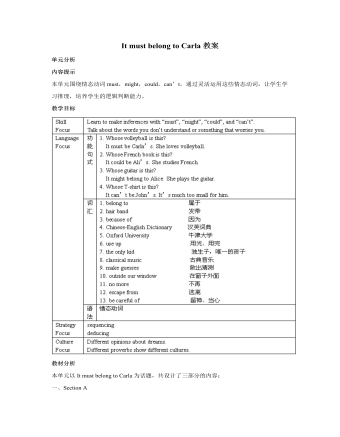
人教版新目标初中英语九年级上册It must belong to Carla教案
一、Section A该部分有4个模块。第一模块围绕Whose volleyball is this? 这一话题展开思维( 1a)、听力(1b)、口语( 1c)训练;第二模块围绕上一模块中的话题进行听力( 2a-2b)、口语训练( 2c);第三模块继续围绕前两个模块中的“making inferences”展开训练。训练形式为阅读排序( 3a)和两人问答(3b);第四模块仍就上一话题展开讨论。二、Section B该部分有4个模块。第一模块要求根据图画和所提供的单词写出合理的句子;第二模块在听力( 2a-2b)和分角色口语训练( 2c)的基础上,继续进行“推测”训练; 第三模块围绕“Strange events in Bell Tower neighborhood”这一话题展开阅读( 3a)和写作(3b -3c)训练;第四模块以dream为话题展开小组活动。三、Self Check该部分有3个模块。第一模块以填空形式对所学词汇进行训练;第二模块就8个谚语展开阅读和讨论。

人教版新目标初中英语九年级上册Where would you like to visit教案2篇
The First PeriodⅠ.Teaching Aims and DemandsKnowledge Objects(1) Key Vocabularytiring, educational, fascinating, thrilling, peaceful, exotic, trek, jungle, take it easy, explore, historic, site(2) Target LanguageWhere would you like to go on vacation?I’d like to trek through the jungle, because I like exciting vacations.2. Ability Objects(1)Train students to talk about places they would like to visit with the target language.(2)Train students to describe vacations with different adjectives.(3)Train students' listening skill.3. Moral Object,It′s more interesting to go on vacating somewhere instead of staying at home.Ⅱ. Teaching Key Points1. Key Vocabularytiring, educational, fascinating, thrilling, peaceful, exotic, trek, jungle, take it easy, explore, historic, site2. Target LanguageTalk about different places with the target language.Ⅲ. Teaching Difficult Points1. Describe vacations with different adjectives.2. Talk about different places with the target language.Ⅳ. Teaching Methods1. Teaching by illumination2. Teaching by doing chain drills3. Teaching by pairworkⅤ. Teaching Aids1. A tape recorder2. Some pictures of different places with famous views

人教版新目标初中英语九年级下册Rainy days make me sad教案
1. 教材分析本单元以how do things affect you?为话题, 从颜色、天气、音乐、广告、产品等方面谈论了外界事物如何影响人的心情。要求学生掌握表达某物或某事给人带来的感觉、看法或影响等。共设计了四个部分的内容:Section A 该部分有4个模块:第一模块围绕Which restaurant would you like to go to?这一话题展开思维(1a)、听力(1b)、口语(1c)训练;第二模块围绕How does music affect you? 进行听力(2a-2b)、口语训练(2c);第三模块继续围绕how do colors in the restaurant affect you这一话题展开训练,训练形式为阅读和问题体验(3a)和小组活动(3b);第四模块仍就How do things affect you这一话题以调查的形式展开讨论。Section B该部分有4个模块:第一模块围绕产品广告对人们的影响这一话题以“配对”(1a)与“列举”(1b)两种形式展开训练;第二模块继续围绕How do things affect you? 进行听力(2a-2b)、口语对话训练(2c);第三模块围绕“Advertising”这一话题展开阅读(3a-3b)和写作(3c)训练;第四模块围绕How posters affect you这一话题以口语训练形式展开小组活动。

人教版新目标初中英语九年级下册Could you please tell me where the restrooms are教案
Step Ⅰ RevisionCheck homework. Ask a few students to read the article in 3a.Then ask a few students to read their guides.Step Ⅱ Part 1Look at the words in the box. Ask a student to read them. Make sure the students understand the meaning of the words. You are to fill in the blanks with the words. In some cases, students may need to use another form of the word, for example adjusting for tense or subject/ verb agreement.Ask students to fill in the blanks on their own.Check the answers. Step ⅢPart 2Go through the instructions with the class.Look at the example with the students.Ask students what the answer would be.Ask a student to read the question and answer it.Excuse me, could you tell me where the bank is, please?The bank is across the street from the shopping malt.Get students to complete the work in pairs.Check the answers. Ask a few students to read their questions.Step Ⅳ Just for Fun!Ask all the students to read the conversation. Ask: What is funny about this cartoon? Help students to explain. A Martian is a person from the planet Mars.There is no such thing as Martian food on Earth, and the clerk looks silly because he is trying to think of where there is a Martian restaurant.Invite some pairs of students to present this conversation to the rest of the class.Step Ⅴ Summary and HomeworkIn this class, we’ve done much writing practice using the key vocabulary words and the target language presented in this unit. After class, please finish the questions in 2 in your exercise books. Then finish the exercises on pages 47~48 of the workbook as well.The Seventh Period Ⅰ Teaching Aims and Demands1. Knowledge Objects(1) Key Vocabularyimage, adventure, jealousy, hero, crime, journey, brave, no longer, show interest in, take it easy, become interested in, plain looks(2)Text:Grown-ups like cartoons, too.2. Ability Objects(1) Fast-reading to get a general idea of the text.(2) Careful-reading to get the detailed information in the text.

人教版新目标初中英语九年级下册I’ll help clean up the city parks教案
Talk about offering help (P60)I’ll help clean up the city parks.A: I’d like to work ...B: You could help ...Talk about ways to tell people about the Clean-Up Day (P61)We need to ...We can’t ...I’ll ...Talk about the work the volunteers do (P62)These three students all volunteer their time to help other people.Somebody loves to ... / helps ... / plans to ... / wants to ...A: What do you like doing?B: I like ... A: What kind of volunteer work do you think I could do?B: You could ...1. 重点词汇advertisement, fix, repair, pleasure, blind, deaf, shut, carry, specially, fetch2. 认读词汇hunger, homeless, cheer, clean-up, sign, establish, major, commitment, elementary, veterinarian, coach, similar, call-in, strategy, disabled, organization, unable, support, appreciate, donation, part of speech, pronoun, adverb, preposition, conjunction, donate, Jimmy, Sally3. 词组clean up, cheer up, give out, put off, set up, think up, take after, fix up, give away, put up, hand out, work out, at once

人教版新目标初中英语九年级下册We’re trying to save the manatees教案2篇
本单元主要围绕着有关濒临灭绝的动物这一话题,学习了应该怎样保护我们的环境,以及就某一问题展开辩论。目标提示语言目标能够运用所学知识,就某一问题展开辩论。认知目标1、复习一些语法:现在进行时、一般现在时、用used to 表示一般过去时、现在完成时、一般过去时的被动语态。2、学会表达同意和不同意。3、学会以下基本句型:We’re trying to save the manatees.Manatees eat about 100 pounds of food a day.There used to be a lot of manatees.In 1972,it was discovered that they were endangered.Some of the swamps have become polluted.情感目标了解一些濒临灭绝的动物的生活习性和濒临灭绝的原因,教育学生应该如何保护环境。教学提示充分利用多媒体等教学设备,创设与本课话题相关的情境,如各种不同种类的动物、动物园以及有关环境的画画等等。围绕着本单元的教学目标,设计一些贴近学生实际的教学任务,如让学生谈论自己最喜欢的动物,如何拯救濒危动物,如何保护环境等等。让学生根据所学知识,就动物园是否对动物有利以及其他的话题进行辩论。

人教版新目标初中英语九年级下册You’re supposed to shake hands教案
教学目标:1. 掌握本单元一些重点词汇的写法和用法。2. 学会自如谈论餐桌礼仪。Step 1 RevisionAsk some students to retell the customs at the table in France in the passage in 3a.Step 2 Self checkPart 1. Fill in each bland with the correct word given. Students do the exercises by themselves at first. Then check the answers. Ask the students to comprehend the sentences and help them point out uses of some words, like “arrive (at / in) sw., spend time / money on sth , spend time / money (in) doing sth.”Part 2. Read about Fan Ling’s experience in a western restaurant. Understand the passage. Point out some key points in the passage.1. be / get used to doing sth. 习惯做某事2. begin with = start with 以….开头3. crowd v. 挤满,塞满 the crowd 人群 crowded adj. 拥挤的Then students discuss about how she would solve her problem. Ask some to share their stories with others.Part 3. Complete the crossword by looking at the sentences on the left. Then check the answers.
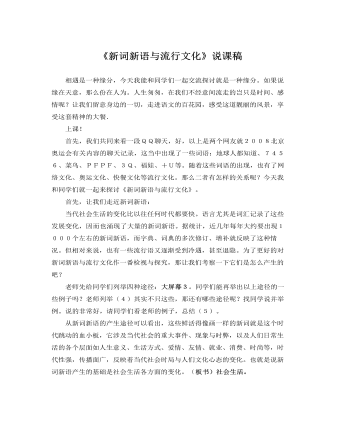
人教版高中语文必修1《新词新语与流行文化》说课稿
当代社会生活的变化比以往任何时代都要快。语言尤其是词汇记录了这些发展变化,因而也涌现了大量的新词新语。据统计,近几年每年大约要出现1000个左右的新词新语,而字典、词典的多次修订、增补就反映了这种情况。但相对来说,也有一些流行语又逐渐受到冷遇,甚至退隐。为了更好的对新词新语与流行文化作一番检视与探究,那让我们考察一下它们是怎么产生的吧?老师先给同学们列举四种途径:大屏幕3。同学们能再举出以上途径的一些例子吗?老师列举(4)其实不只这些,那还有哪些途径呢?找同学说并举例。说的非常好,请同学们看老师的例子,总结(5)。从新词新语的产生途径可以看出,这些鲜活得像画一样的新词就是这个时代跳动的血小板,它涉及当代社会的重大事件、现象与时弊,以及人们日常生活的各个层面如人生意义、生活方式、爱情、友情、就业、消费、时尚等,时代性强,传播面广,反映着当代社会时局与人们文化心态的变化。
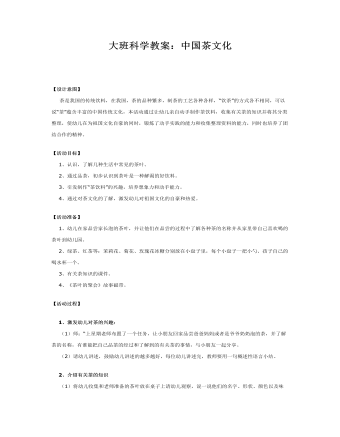
大班科学教案:中国茶文化
【活动目标】 1、认识,了解几种生活中常见的茶叶。 2、通过品茶,初步认识到茶叶是一种解渴的好饮料。 3、引发制作“茶饮料”的兴趣,培养想象力和动手能力。 4、通过对茶文化的了解,激发幼儿对祖国文化的自豪和热爱。【活动准备】 1、幼儿在家品尝家长泡的茶叶,并让他们在品尝的过程中了解各种茶的名称并从家里带自己喜欢喝的茶叶到幼儿园。 2、绿茶、红茶等:茉莉花、菊花、玫瑰花冰糖分别放在小盘子里,每个小盘子一把小勺、孩子自己的喝水杯一个。 3、有关茶知识的课件。 4、《茶叶的聚会》故事磁带。【活动过程】 1、激发幼儿对茶的兴趣: (1)师:“上星期老师布置了一个任务,让小朋友回家品尝爸爸妈妈或者是爷爷奶奶泡的茶,并了解茶的名称,有谁能把自己品茶的经过和了解到的有关茶的事情,与小朋友一起分享。 (2)请幼儿讲述,鼓励幼儿讲述的越多越好,每位幼儿讲述完,教师要用一句概述性语言小结。
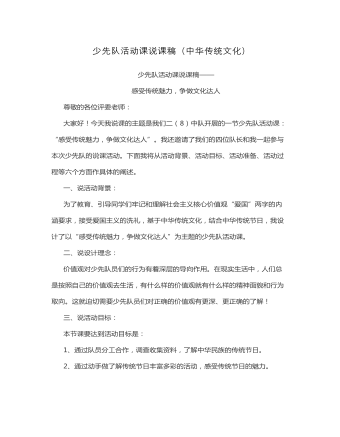
少先队活动课说课稿(中华传统文化)
尊敬的各位评委老师:大家好!今天我说课的主题是我们二(8)中队开展的一节少先队活动课:“感受传统魅力,争做文化达人”。我还邀请了我们的四位队长和我一起参与本次少先队的说课活动。下面我将从活动背景、活动目标、活动准备、活动过程等六个方面作具体的阐述。一、说活动背景:为了教育、引导同学们牢记和理解社会主义核心价值观“爱国”两字的内涵要求,接受爱国主义的洗礼,基于中华传统文化,结合中华传统节日,我设计了以“感受传统魅力,争做文化达人”为主题的少先队活动课。二、说设计理念:价值观对少先队员们的行为有着深层的导向作用。在现实生活中,人们总是按照自己的价值观去生活,有什么样的价值观就有什么样的精神面貌和行为取向。这就迫切需要少先队员们对正确的价值观有更深、更正确的了解!三、说活动目标:本节课要达到活动目标是:1、通过队员分工合作,调查收集资料,了解中华民族的传统节日。2、通过动手做了解传统节日丰富多彩的活动,感受传统节日的魅力。3、基于传统文化小达人的评比,激发队员们对传统节日的热爱,增强对传统节日的亲近感。教学重点是引导队员们通过合作互动了解中华传统节日,培养爱国意识。难点是让队员对“爱国”这一抽象的价值观内化成感性的认知。四、说活动准备:辅导员:少先队员是少先队活动课的主体,因此本堂课前作为辅导员,在本堂课前主要准备收集各项资料,制作相关教案课件,起到引导作用。队员们则分成四支小队在准备期通过自主合作进行了充分的准备,并在课堂中做了精彩的展示。

(初中)国旗下讲话:《学会谦让,文明相处》
中国自古就有“礼仪之邦,文明古国”的美称。我们是华夏子女本应接过文明的接力棒,传承中华民族的美德,但是,我们的身边却时有不文明、不谦让的现象发生。例如:每至中午,同学们便争先恐后的涌进食堂。在食堂中,我看见了:插队、打闹、你争我抢,这样是谦让吗?每至晚上,坐公共汽车时,我看见了:插队、你推我,我推你,打打闹闹,甚至骂人动粗,这样是谦让吗?同学之间有了矛盾,不是和平解决,而是在社会上集结一帮所谓“志同道合”的兄弟,想用这种粗暴地方法“一决胜负”,这是所谓的谦让吗?
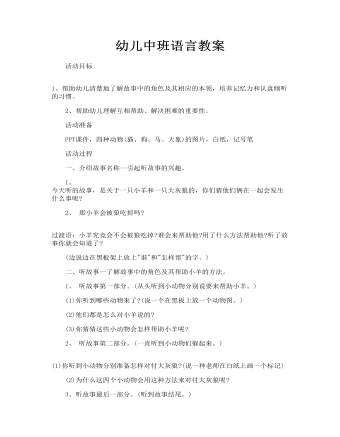
幼儿中班语言教案
一、介绍故事名称--引起听故事的兴趣。 1、 今天听的故事,是关于一只小羊和一只大灰狼的,你们猜他们俩在一起会发生什么事呢? 2、 那小羊会被狼吃掉吗? 过渡语:小羊究竟会不会被狼吃掉?谁会来帮助他?用了什么方法帮助他?听了故事你就会知道了? (边说边在黑板架上放上"谁"和"怎样帮"的字。)

初中英语说课教案
(二) 教学目标 依据并结合新课程标准提出的基础教育阶段英语课程的总体目标和具体要求,我将本课教学目标设计如下: 知识目标: 让学生掌握其中的重要词汇mind, turn down, not at all等和句式would you mind doing sth? 并能让学生掌握如何运用所学句式提出礼貌请求以及礼貌的向他人道歉。

大班语言教案:《风中之叶》
2、学习运用各种感官进行有趣的描述。3、在游戏中发挥想象,创编儿歌《落叶飘》。二、 活动准备:1、环境布置:活动室内布置有小河、草地、马路。2、材料准备:人手一张不同形状的树叶。3、事先教唱歌曲《小树叶》。三、 活动过程:1、游戏:“捡落叶”(1) 师:今天老师带来了好多树妈妈的小宝贝,你们猜猜是谁?幼:是小树叶。(2) 师:一阵风吹过来,小树叶吹走了,赶紧去捡起来吧。幼儿每人捡一片自己喜欢的落叶。(3) 请幼儿描述一下自己的落叶长得什么样?并用形体动作表现出叶子的造型。(长长的、宽宽的、尖尖的、圆圆的、破一个洞的------)

幼儿园中班语言教案:芽
2.初步理解"胆怯、健康、坚强、欢畅"等词,学习句式"别怕,我把你×一×,你就会变得更××"。3.乐于助人并懂得感恩。活动准备1.知识经验准备:幼儿观察过种子发芽的过程。2.物质材料准备:嫩芽实物、大图书、表演道具。活动过程 一、激趣导入,链接已有经验(链接、激趣)1.老师带来了一位朋友。是谁?你喜欢她吗你想对她说些什么.嫩芽是从哪里出来的?她刚刚从泥土里出来。会觉得怎么样呢?(做出小心胆怯的样子二、突出重点,理解散文内容。(思考、表达出示图书第一页)瞧,她多害怕呀!为什么会害怕呢?(教师有感情地朗诵第一段)嫩芽像什么呀?我们来学一学胆怯的样子。2.嫩芽这么胆怯、害怕,猜猜有谁会来帮助她。让她快快长大呢?根据幼儿回答情况分别出示图,并提问:被太阳照耀着。会感到怎么样?(温暖)被风儿抚慰着,会感到怎么样?(亲切)被雨露滋润着.会感到怎么样?(就像我们口渴的时候喝到水一样舒畅)(教师配合图朗诵第二段)
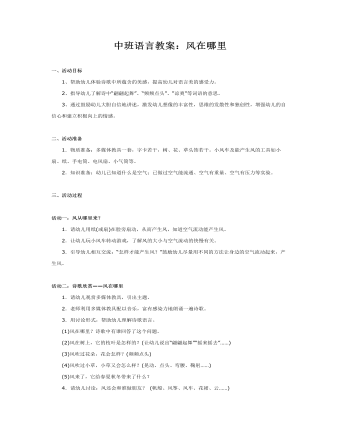
中班语言教案:风在哪里
二、活动准备1.物质准备:多媒体教具一套,字卡若干,树、花、草头饰若干。小风车及能产生风的工具如小扇、纸、手电筒、电风扇、小气筒等。2.知识准备:幼儿已知道什么是空气;已做过空气能流通、空气有重量、空气有压力等实验。 三、活动过程 活动一:风从哪里来?1.请幼儿用纸(或扇)在脸旁扇动,从而产生风,知道空气流动能产生风。2.让幼儿玩小风车转动游戏,了解风的大小与空气流动的快慢有关。3.引导幼儿相互交流:“怎样才能产生风?”鼓励幼儿尽量用不同的方法让身边的空气流动起来,产生风。
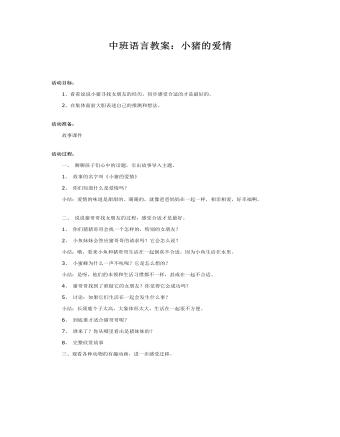
中班语言教案:小猪的爱情
活动准备: 故事课件活动过程: 一、聊聊孩子们心中的话题,引出故事导入主题。1、故事的名字叫《小猪的爱情》2、你们知道什么是爱情吗? 小结:爱情的味道是甜甜的、暖暖的,就像爸爸妈妈在一起一样,相亲相爱,好幸福啊。 二、说说猪哥哥找女朋友的过程,感受合适才是最好。1、你们猜猪哥哥会找一个怎样的,特别的女朋友?2、小鱼妹妹会答应猪哥哥的请求吗?它会怎么说? 小结:哦,看来小鱼和猪哥哥生活在一起倒真不合适,因为小鱼生活在水里。

中班语言教案:大树和小鸟
2、初步学习按诗歌的结构仿编诗歌。 准备: 图片。 过程:一、游戏:大树和小鸟。——教师扮演大树,幼儿扮演一群小鸟。引导幼儿在大树周围做各种动作,如亲亲大树、摸摸大树、在大树旁跳舞、为大树捉虫等。——大树和小鸟在一起开心吗?有一首诗歌讲的就是“大树和小鸟”的事情。